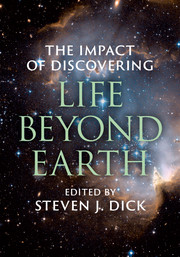Book contents
- Frontmatter
- Dedication
- Contents
- List of contributors
- Introduction: Astrobiology and society
- Part I Motivations and approaches: How do we frame the problems of discovery and impact?
- Part II Transcending anthropocentrism: How do we move beyond our own preconceptions of life, intelligence, and culture?
- Part III Philosophical, theological, and moral impact: How do we comprehend the cultural challenges raised by discovery?
- 10 Life, intelligence, and the pursuit of value in cosmic evolution
- 11 “Klaatu Barada Nikto” – or, do they really think like us?
- 12 Alien minds
- 13 The moral subject of astrobiology: Guideposts for exploring our ethical and political responsibilities towards extraterrestrial life
- 14 Astrobiology and theology
- 15 Would you baptize an extraterrestrial?
- Part IV Practical considerations: how should society prepare for discovery – and non-discovery?
- Contributor biographies
- Index
- References
10 - Life, intelligence, and the pursuit of value in cosmic evolution
from Part III - Philosophical, theological, and moral impact: How do we comprehend the cultural challenges raised by discovery?
Published online by Cambridge University Press: 05 November 2015
- Frontmatter
- Dedication
- Contents
- List of contributors
- Introduction: Astrobiology and society
- Part I Motivations and approaches: How do we frame the problems of discovery and impact?
- Part II Transcending anthropocentrism: How do we move beyond our own preconceptions of life, intelligence, and culture?
- Part III Philosophical, theological, and moral impact: How do we comprehend the cultural challenges raised by discovery?
- 10 Life, intelligence, and the pursuit of value in cosmic evolution
- 11 “Klaatu Barada Nikto” – or, do they really think like us?
- 12 Alien minds
- 13 The moral subject of astrobiology: Guideposts for exploring our ethical and political responsibilities towards extraterrestrial life
- 14 Astrobiology and theology
- 15 Would you baptize an extraterrestrial?
- Part IV Practical considerations: how should society prepare for discovery – and non-discovery?
- Contributor biographies
- Index
- References
Summary
As life and intelligence continue to evolve in the universe, it is reasonable to wonder where it all may lead, and what, if anything, it may mean. Such contemplations have consumed, befuddled, and perhaps even harmed humanity since we were first able to entertain such matters. From philosophy to science, from religion to spirituality, we have wondered about some larger meaning or purpose, some possible direction for life and intelligence. This is almost always discussed in the context of a broader “objective” external reality to help provide a compelling frame of reference for explaining and navigating the bewildering complexities of human life. Contemplating potential implications or roles for life and intelligence in cosmic evolution should be seen in this larger experiential, emotional, and intellectual context, recognizing that discerning patterns, trends, and theories in cultural change is a tricky business (Denning 2009).
Cosmic contemplations for life and intelligence are subject to wide-ranging speculation and perhaps a certain level of hubris, and hence are justifiably susceptible to deep skepticism and harsh criticism. But in trying to explore more thoroughly the potential futures of humanity and other beings in the universe, it seems reasonable to consider at least a few lines of thinking that place future evolutionary trajectories of life and intelligence in a long-term cosmic context. Ancient religions as well as more contemporary religous and spiritual movements have much to say about life and intelligence in a universal context. Science also has much to say about the past evolution of life and intelligence in a cosmic context, and perhaps even a bit to say about the long-term future. Careful philosophical considerations can leverage the science we understand today, and the best of philosophical thinking, to explore potential sources of meaning and purpose, and articulate some rough themes for the future of life and intelligence in the universe.
This breadth of thought that places life and intelligence in a cosmic context ranges from western and eastern religious worldviews such as Hinduism, to natural theology and Western philosophers such as Plato, Giordano Bruno, and Baruch Spinoza. Alfred North Whitehead's process philosophy (1929), Teilhard de Chardin's Omega Point Theory (1955), and Arthur O. Lovejoy's treatment of the principle of plenitude (1936) are all part of this tradition.
- Type
- Chapter
- Information
- The Impact of Discovering Life beyond Earth , pp. 159 - 174Publisher: Cambridge University PressPrint publication year: 2015
References
- 3
- Cited by

